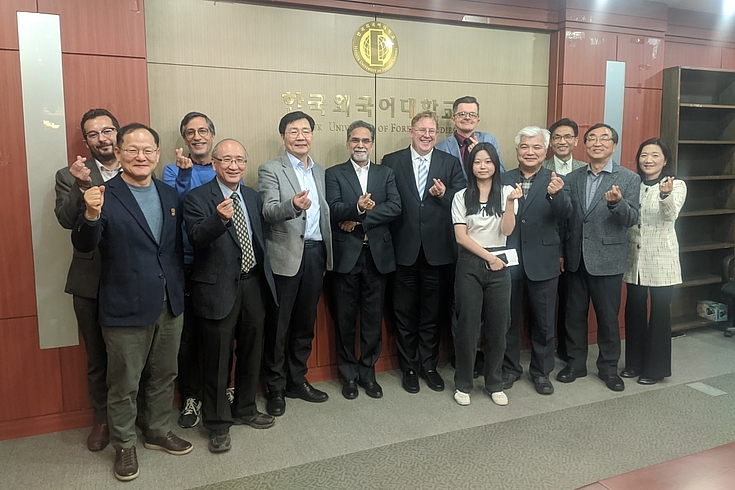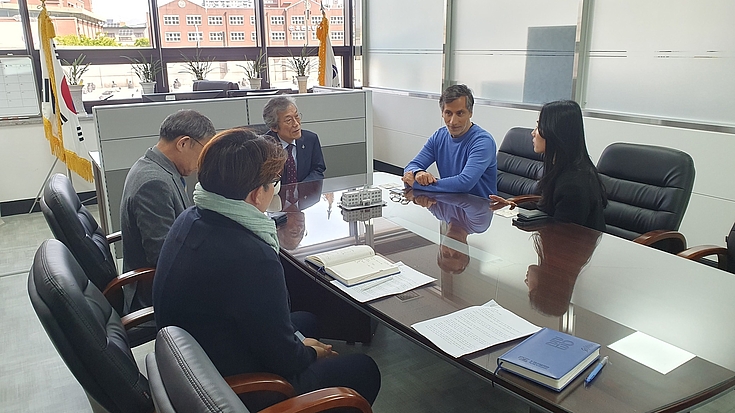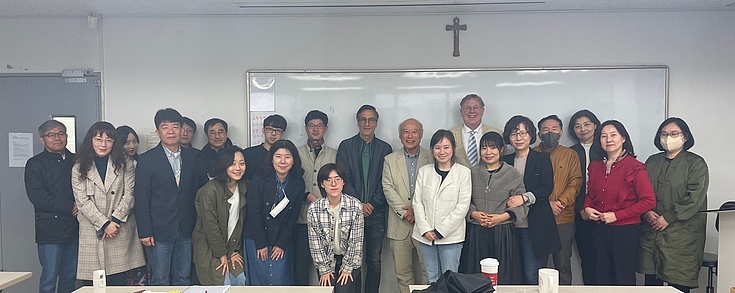Event
Democracy in the spotlight – Prof. Dr. Görlach’s visit to Seoul and events with HSF
During his visit to Seoul in early April, Prof. Dr. Alexander Görlach from New York University and Carnegie Endowment for Peace attended several events organized by Hanns Seidel Foundation. These events, centered around the state of democracy in Northeast Asia, were held in cooperation with multiple organizations in Seoul and Gwangju.

Roundtable with the Council on Diplomacy for Korean Unification
April 7, Hankuk University of Foreign Studies
On April 7, Hanns Seidel Foundation Korea, and the Council on Diplomacy for Korean Unification (CDKU) hosted a roundtable discussion under the guiding question “How do we deal with the rise of China?”. After an initial input held by Prof. Dr. Alexander Görlach democracy in Northeast Asia, a lively discussion ensued among the experts present. The discussion touched upon security and economic issues and the Korean peninsula. While some argued that China’s influence is on the rise, others have argued that China’s influence is in fact in decline, due to a rise of internal conflicts, in particular on economic matters. Prof. Görlach called for a joint strategy against a rising and more assertive China, based upon the “likemindedness” of countries rather than formal alliances. Later, Saroj Dash shared his experience of living in Pyongyang for an extended period of time when he was stationed there for Concern Worldwide. In particular, he was worried about the current humanitarian situation, after the worldwide aid for precarious groups like lactating women, pregnant women, and small children as well as the elderly completely stopped. Generally, he was not optimistic about a rapid return of international aid to North Korea, though he confirmed to Concern Worldwide would be ready to go back once the country opens up again.

Meeting with The 5.18 Memorial Foundation and 518 Research Institute at Chonnam National University
April 10, Gwangju
Gwangju is the symbol of democracy - especially, The May 18 Foundation, which develops the nation by remembering the spirit of struggle and solidarity of the May 18 Uprising in Korea.
On 10 April, Prof. Dr. Alexander Görlach, NYU, and Dr. Hyun-ah Choi, HSF Korea, visited the 5.18 Memorial Foundation and discussed the history of democracy and its current status. The foundation works for public awareness of the democracy movement for the youth and the public and monitors fake news with the public. Last year, the foundation launched international democracy research to enhance the democracy network. The meeting participants agreed on cooperation with multi-stakeholders and working together in the future. After meeting with The 5.18 Memorial Foundation, Prof. Dr. Görlach and Dr. Choi also visited the old Jeollnam-do Province hall and 518 Research Institute at Chonnam National University.

“Freedom and Human Personality”
April 11, Special lecture at Sogang University
As part of his lecture and discussion trip to South Korea, Prof. Dr. Alexander Görlach gave a special lecture in the class of Prof. Dr. Kim Yong-Hae SJ, Sogang University, on “Freedom and Human Personality”. He started his lecture by reflecting on the fact that the famous “Hymn to Joy” of Beethoven (from his 9th Symphony) originally was supposed to be the “Hymn of Liberty” but could not be called so due to political sensitivities in the Napoleonic and post-Napoleonic times. Freedom and human dignity have for thousands of years been a topic of speculation and deliberations, but at the same time only massive violations of these – like in the 30-years-war in Europe, or the two World Wars – seem to have brought people to try to find laws or organizational forms reducing violations of dignity – and even these were neither complete nor secured forever. New challenges, like the current Russian aggression in Ukraine or the aggressive Chinese foreign policy, pose new problems. The question of human dignity will always need re-confirmation and needs to be secured against the challenges of every time.
